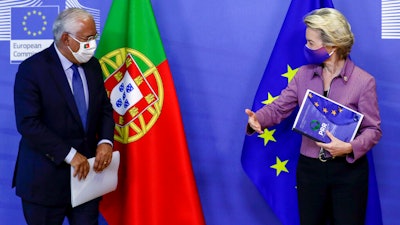
BRUSSELS (AP) — European Union leaders remain divided about a more ambitious target for cutting greenhouse gas emissions and will not reach an agreement at their summit starting Thursday.
According to a draft of the meeting's findings seen by The Associated Press, leaders will at this summit only start discussing a proposal to reduce emissions by at least 55% by 2030 compared to 1990 levels, as put forward by European Commission, the bloc's executive arm.
The proposal compares with the current target of a 40% reduction by 2030.
The goal is to reach an agreement in December ahead of the adoption of the first ever European climate law.
In proposing a reduction target of at least 55% by 2030, EU commission President Ursula von der Leyen predicted in September that the new target would be “too much for some and not enough for others."
So far the cuts have been slightly more than 20% over the past 30 years. Reducing emissions by another 20% or even 35% within the next decade poses a big challenge to many countries.
Supported by Germany, Von der Leyen’s revised target needs to be endorsed by the 27 EU member states in order to make it legally binding. On Wednesday, a group of 11 countries including Denmark, Estonia, Finland, France, Ireland, Latvia, Luxembourg, the Netherlands, Portugal, Spain and Sweden embraced her ambition in a joint statement published ahead of the summit in Brussels.
“Let us, as a Union, deliver a strong and credible response to the climate crisis and increase our 2030 climate target to at least 55%, leading to climate neutrality by 2050," they said in the statement.
But officials said there is no agreement across the bloc.
While the European Parliament pushes for an even greater 60% reduction in emissions, some eastern EU countries that depends on coal for much of their energy needs are less enthusiastic. They worry about the social, environmental and economic costs of the transition to a greener economy. Poland last year did not commit to the EU's 2050 climate neutrality goal and is asking for more details about the measures.
Speaking upon arrival at the summit, Czech Prime Minister Andrej Babis pleaded in favor of a collective target.
“I think every country has a different energy mix, and we have to take it into consideration," he said.
Babis added that in any case this is just a first exchange about climate change and that leaders will return to the matter “more seriously” in December.
Von der Leyen has said she wants 37% of the 750 billion euros in the coronavirus recovery fund to be given to EU countries to spend on environmental objectives, while 30% of the bloc's regular budget should be used for tackling climate change.
World leaders agreed five years ago in Paris to keep the global warming increase to below 2 degrees Celsius (3.6 degrees Fahrenheit), and ideally no more than 1.5 degrees C (2.7 F) by the end of the century.
Scientists say countries will miss both of those goals by a wide margin unless drastic steps are taken to begin cutting greenhouse gas emissions. Under the Paris Agreement, countries are due to submit updated climate targets by the end of the year.






















